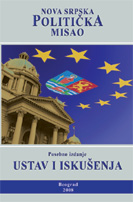| NSPM in English | |||
Obama to Wall St.: ‘Join Us, Instead of Fighting Us’ |
 |
 |
 |
| петак, 30. април 2010. | |
|
(The New York Times, 23.4.2010)
Addressing leaders of New York’s financial giants, including Goldman Sachs, Mr. Obama described himself as a champion of change battling “battalions of financial industry lobbyists” and the “withering forces” of the economic elite. With his poll numbers sagging, the choreographed confrontation seemed aimed at tapping the nation’s antiestablishment mood as well as muscling financial regulation legislation through Congress. But the president also struck a note of conciliation with an industry that has contributed generously to his party, beseeching bankers to work with him to forge a new regulatory structure. While he spoke, his Democratic allies in Washington moved to force a showdown in the Senate on Monday, scheduling a procedural vote that will test the prospects for bipartisan compromise and Republican resolve to block the president’s plans. “I want to urge you to join us, instead of fighting us in this effort,” Mr. Obama said in his address at Cooper Union in Manhattan. “I’m here because I believe that these reforms are, in the end, not only in the best interest of our country, but in the best interest of the financial sector.” The regulation battle has become the president’s top legislative priority since he signed his health care program into law last month, and both parties are jockeying for position six months before midterm elections. Mr. Obama and his allies have eagerly portrayed Republicans as handmaidens of Wall Street while Republicans have accused Democrats of trying to strangle the market and institutionalize bailouts. While Mr. Obama avoided directly criticizing Republicans in his address, the partisan tension in the capital heated up again when Senate Republicans blocked an effort by Democrats to start debate on their regulation bill. Senator Mitch McConnell of Kentucky, the Republican leader, said Democrats were pre-empting negotiations, while Senator Harry M. Reid of Nevada, the Democratic leader, said Republicans were simply stalling. Business interests and their allies used Mr. Obama’s visit to New York to trumpet their opposition to his plans. The New York Post ran a front-page editorial under the banner headline, “Dear Mr. President, Don’t Kill the Golden Goose: City Economy Imperiled in the Name of ‘Reform.’ ” The United States Chamber of Commerce took out full-page ads in New York newspapers echoing the concerns of Mayor Michael R. Bloomberg, saying that “beating up on Wall Street may be good short-term politics — but not if it gets in the way of the right solutions.” Republicans argued that Mr. Obama’s plan would encourage risky behavior and empower regulators who failed to use the authority they already have. “President Obama says he believes in the power of free markets but his policies prove otherwise,” said Representative Spencer Bachus of Alabama, the senior Republican on the House Financial Services Committee. “Under the Democrat plan, certain financial institutions have no freedom to fail, and are instead propped up by taxpayer bailouts and government loan guarantees.” But Mr. Obama argued that he was advocating “a common-sense, reasonable, nonideological approach” that would strengthen consumer protection, limit the size of banks and the risks they can take, enforce greater transparency for derivatives and other complex securities, and impose more scrutiny of executive compensation. “Unless your business model depends on bilking people, there is little to fear from these new rules,” he said. He also bristled at the claim that Democratic legislation would institutionalize future bailouts of big banks. “That may make for a good sound bite, but it is not factually accurate,” he said. “It is not true. In fact, the system as it stands is what led to a series of massive, costly taxpayer bailouts. And it’s only with reform that we can avoid a similar outcome in the future.” As he castigated Wall Street for its “failure of responsibility” that led to the financial crisis, listening in the audience were some of the city’s most prominent bankers, including Lloyd C. Blankfein, the chief executive of Goldman Sachs, and Gary Cohn, its chief operating officer. The bank was accused by the federal government last week of defrauding investors during the crisis. Also on hand were top executives from JPMorgan Chase, Morgan Stanley, Credit Suisse, Barclays and Bank of America, as well as Mr. Bloomberg, Gov. David A. Paterson and the New York attorney general, Andrew M. Cuomo. The bankers all left the room swiftly after Mr. Obama’s remarks without stopping to offer much reaction. At the Capitol, Republicans rejected Mr. Reid’s efforts to start a debate leading to a vote, arguing that bipartisan discussions were still under way. “I’m not going to waste any more time of the American people,” Mr. Reid said at a news conference. “I don’t think bipartisanship is a waste of time,” Mr. McConnell retorted later in the day. Mr. Reid scheduled a first procedural vote for Monday evening that will force Republicans to choose between starting debate or blocking the motion. Some Republicans said they expected Democrats to force several such votes before any deal is reached as a way to paint the G.O.P. as obstructionist. Democrats have expressed little willingness to make big concessions but need at least one Republican to overcome a filibuster. Among the chief Republican objections is a proposed $50 billion fund, to be financed by big financial companies, that would be used to take apart any failing banks and put them out of business. The Obama administration also opposes that fund out of concern that it might hamper rather than aid efforts to deal with costly bank failures. Republicans have also expressed concern about a new consumer protection agency that they say could pre-empt existing state laws. Republicans also oppose a proposal in a bill advanced by Senator Blanche Lincoln, Democrat of Arkansas, requiring the biggest banks to spin off their derivatives businesses. Democrats rebutted Republican criticisms on Thursday at a news conference where they showed video clips of Republican leaders making what the Democrats called false assertions about the bill. Republicans argued Democrats had not been honest with the American people. Mr. Baker reported from New York and Mr. Herszenhorn from Washington. This article has been revised to reflect the following correction: Correction: April 24, 2010 A picture caption on Friday with the continuation of an article about President Obama’s address on tightening financial regulations misidentified one of the executives shown. The man at the left with his hand on his cheek is Robert Greifeld, chief executive of Nasdaq — not Robert E. Diamond Jr., president of Barclays, who is at the far right. (As the caption correctly noted, Paul Calello of Credit Suisse is in the center.) http://www.nytimes.com/2010/04/23/business/economy/23obama.html?src=me&ref=business |
Од истог аутора
Остали чланци у рубрици
- Playing With Fire in Ukraine
- Kosovo as a res extra commercium and the alchemy of colonization
- The Balkans XX years after NATO aggression: the case of the Republic of Srpska – past, present and future
- Из архиве - Remarks Before the Foreign Affairs Committee of the European Parliament
- Dysfunction in the Balkans - Can the Post-Yugoslav Settlement Survive?
- Serbia’s latest would-be savior is a modernizer, a strongman - or both
- Why the Ukraine Crisis Is the West’s Fault
- The Ghosts of World War I Circle over Ukraine
- Nato's action plan in Ukraine is right out of Dr Strangelove
- Why Yanukovych Said No to Europe

.jpg)








 President Obama
President Obama











